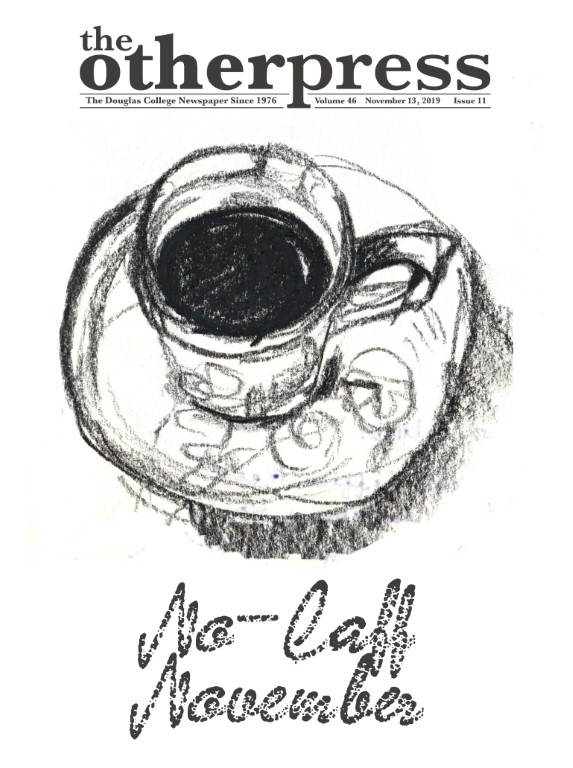 \
\
Caffeine addiction and effects on the student brain
By Jessica Berget, Editor-in-Chief
To many students, coffee is a best friend. It wakes you up for the day ahead and can also give you that extra jolt you need to finish whatever work you’ve put off until the last minute. However, as much as students think coffee is a great chum, the drink may actually be their worst enemy.
College students have a unique relationship with coffee. With so much to do—and so little time to do it all—many students spend sleepless nights peered over their laptops finishing up their assignments with a large mug of coffee at their side. I know this because I am currently writing this at 3:30 am doing exactly that. Unfortunately, for many students, this means that they won’t get the recommended amount of sleep they need each night. The obvious solution to this? Drink more coffee.
Drinking copious amounts of coffee or any other caffeinated drink is something many Canadian college students know all too well. In fact, according to the president of the Coffee Association of Canada, Sandy McAlpine, Canadians love their coffee—over 65 percent of people over 18 consume it everyday. This should come as no surprise to Douglas College students; we’ve all seen how long the Tim Hortons line-up gets, and the high number of coffee cups in classes. Due to staying up all night and trying to stay awake and focused all day, students need that little boost of energy. Unfortunately, this lifestyle leads to many forming a dependence or addiction to caffeine. I know this because not too long ago, I had developed one myself.
A couple months ago, I was a coffee drinking machine. I would drink up to two to three cups a day, and sometimes even a couple espresso beverages (curse the free coffee drinks at my other job). After noticing how anxious it made me, how tired I became in the middle of the day, and how groggy I was before my morning cup of joe, I knew I needed to cut my daily coffee intake down entirely. To test these limits and the affect copious amounts caffeine had on my body, I decided to stop drinking coffee for a month. They say the first week is the hardest, so I documented the changes I noticed during the first few days.
On the first day, the first thing I did when I woke up was start to make myself a cup of coffee. As I began boiling the water, I remembered my goal of cutting it out for the month. Frustrated, I opted for a cup of Earl Grey tea instead… but it’s not the same. A cup of coffee has nearly 95 milligrams of caffeine, while a cup of tea has about 22 milligrams. A significant difference to someone who drinks at least two cups of coffee everyday. I felt sluggish all day and couldn’t stop thinking about how much I missed coffee.
The second day was a true test of my will: I had a 5 am opening shift at my bakery job. I had to resist my aching tiredness and the free coffee I get on shift. I drink Earl Grey tea again to replace the need for coffee, but it doesn’t do anything in terms of waking me up. One thing I notice after going just a couple of days without coffee is that I’m less jittery. My thoughts aren’t racing through my mind as much as they did when I drank coffee, but that could just be because I was too tired from caffeine withdrawal.
The third, fourth, and fifth day all ended up the same. I drank tea instead, didn’t crash by midday, and was able to go to bed at a reasonable time because I didn’t have my afternoon cuppa. The longer I went without drinking coffee, the more I realized I didn’t need it. I felt better and more awake in the morning, which was a nice change from the usual morning daze I had before my first coffee. Maybe I should have cut it out sooner.
Douglas College Psychology Professor, Nicole Vittoz. explains the effects of caffeine on our brain and bodies to the Other Press. She says caffeine is a molecule similar to Adenosine, a neurotransmitter that produces calming effects in the brain and body. Caffeine binds and blocks receptors of Adenosine, which prevents the calming effects and instead produces a more excitable set of cells in the body and brain. This contributes to the effects of caffeine we feel in our body—such as feeling jittery, an increased heart rate, heartburn, urination, etc. In our brains, it makes us more alert and improves mental focus.
Vittoz also explains that dependence relies on the individual and how much caffeine they are putting into their body each day—dependence is usually found in people who drink a lot of it.
“The more we use a drug, the more our body and brain adjusts to the presence of the drug. This process is known as tolerance. Over time, with repeated use of the drug, our systems begin to compensate, and respond less and less to the drug. In response, the user will tend to increase their dose, going from one cup of coffee each morning to requiring two to three [to] feel its usual stimulating effects. Once caffeine dosage escalates, we are at greater risk for experiencing those unpleasant withdrawal symptoms when we have less caffeine or no caffeine at all,” she said in an email interview with the Other Press.
Consuming caffeine may have some perks, but there are some downsides, especially if one forms a dependence or addiction to it. In fact, according to Beth Doxsee—a peer health outreach coordinator at Queen’s Health—drinking lots of caffeine has been linked to insomnia, irritability, anxiety, high blood pressure, and elevated heart rates. She also says it has a major affect on one’s mood and can exacerbate anxiety for those who get anxious. This is something I noticed in my experience in drinking coffee, and the stress of going to both school and work probably doesn’t fare well for students who also consume lots of coffee or caffeine everyday.
I lasted almost a whole month without coffee, but since student life is so damn demanding, I had to search for other means to fulfill my forceful caffeine craving for a perk-up on those especially hectic days. On some occasions I settled for Monster energy drinks, but the amount of sugar in them made me sick. After going a few weeks without the comfort of coffee, I developed a love for a morning cup of tea. I found it made me much calmer in my daily routine and didn’t give me the mid-day crash that coffee usually does. I still do love my coffee, but now I avoid making it a habit of drinking it every day—saving it for days when I am truly exhausted. For my everyday caffeine fix though, I’m sticking with tea—and that’s the tea.


